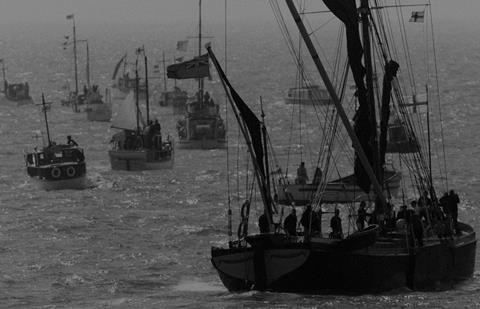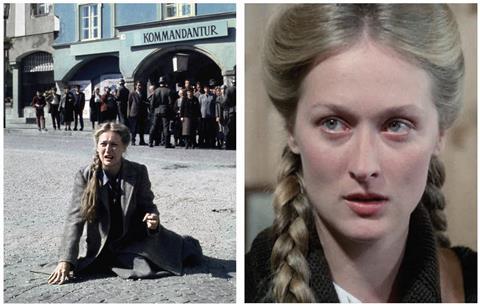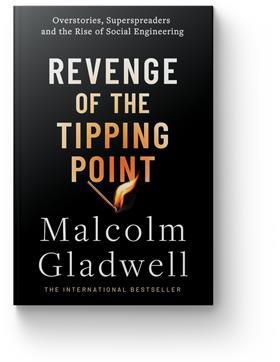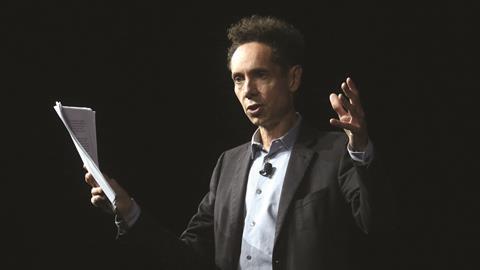One of the world’s leading non-fiction writers doesn’t write much about his own Christian faith. And yet when you apply Malcolm Gladwell’s Revenge of the Tipping Point to the Church’s evangelism the implications are exciting, says Martin Saunders
How did they gather so many boats?
The Dunkirk evacuation is one of the most remarkable moments in Britain’s long and eventful military history. In the Allies’ so-called ‘darkest hour’, as the British army faced almost total annihilation on the beaches of northern France, a daring rescue plan grew from last-ditch gambit into full-blown miracle. Churchill had hoped to save 30,000 retreating men; in the end more than ten times that many were recovered. It was arguably the single biggest turning point of the second world war.
The miracle of Dunkirk is one of the more extraordinary occasions in our country’s Christian history. Churchill’s rallying of small boats from around the British Isles was catalysed by a National Day of Prayer. King George VI, a devout believer, was the galvanising force behind a call to head to the churches; its observance was near total as the nation dropped to its knees. Then, we stood up and fought back; the number of rescue boats dwarfed Churchill’s most hopeful estimate, and the army was liberated from the jaws of death.
Who might we naturally overlook, who may be incubating the power to take Christianity viral?
Which poses the question: if the same threat faced us today, would the UK turn to God in prayer, and – propelled by the Spirit’s power – rediscover a national sense of extraordinary courage and selfless sacrifice? The answer is simple: of course not. Why? Because our overstory has changed.
No, that’s not a misprint. The concept of an ‘overstory’ is coined by non-fiction maestro Malcolm Gladwell in his new book, Revenge of the Tipping Point (Abacus). It’s the idea that a place – which could mean a relatively local area, an entire nation or even a culture – is overshadowed by a kind of meta-narrative which profoundly impacts what happens there.
For example, Gladwell tells the tragic story of a seemingly perfect American town that became the setting for a spate of awful teenage suicides. He argues that the chief reason why suicide became contagious was the town’s stifling, super-competitive, no-room-for-ordinary culture. The town had an overstory that taught its young inhabitants that only ceaseless striving for perfection was good enough…and the effects were devastating.

The overstory concept is one of two main ideas driving Revenge, which is a 25th-anniversary sequel to Gladwell’s earlier bestseller, The Tipping Point (Abacus). Gladwell’s initial book became one of the most important and widely read social science books of modern times, ranking among the 100 best books of the 21st century in a list compiled by The Guardian.
Both books are concerned with the subject of epidemics: how ideas, social phenomena, diseases and more reach a ‘tipping point’ at which they have a major impact on culture. Initially Gladwell had set out to create an updated edition of his most famous work, using the principles within it to illuminate notable modern examples of epidemics, and indeed pandemics. On revisiting the work, however, he began to discover that those principles no longer neatly fit.
In the first book, Gladwell wrote about “the power of context”: the idea that cultural and geographical location helps to create the conditions for an epidemic to fit. Now he’s returned with a more precise suggestion for why that is: which is where the idea of an overstory comes in.
The overstory of 1940s Britain is a fascinating mix of well-documented stoicism and now-inconvenient devotion to God. The brave resolve which got Londoners through the Blitz was both rooted in – and became a lingering narrative of – national pride. This sense of selfless and courageous devotion to king and country was certainly part of the context behind the Dunkirk miracle, but not the whole story. The fact that a National Day of Prayer was called, but also widely responded to, suggests a profoundly religious element to the national identity at the time. The British people believed, at a culture-wide level, that they were a Christian people, and that an action like prayer would have a powerful effect even in the theatre of war. This was the overstory that flew above the flotilla of small boats that made their way across the Channel.
To put it another way: you could argue that the Dunkirk miracle was only possible in those circumstances. The people simply wouldn’t have responded on the scale they did without an overstory that allowed the idea of this daring and dangerous rescue plan to become infectious. Which naturally raises the question: what kind of national overstory hangs above Britain now? In 1940, our ‘darkest hour’ was illuminated by the hope of faith. In 2024, there’s a distinct lack of either faith or hope. This is a time of downturn, fear and division. That’s the cultural story we’re living in.
Thankfully, Gladwell’s suggestion is that it’s possible to subvert and change an overstory. His chief examples explore how television has been used to change a national conversation, and eventually a cultural perspective. The most compelling illustration of this concerns the American view of the Holocaust – barely mentioned until 1978, and seldom under that label – which changed almost overnight with the airing of a TV miniseries starring Meryl Streep.

Although it’s hard for us to imagine, the overarching view now held around that horrifying event was not automatically absorbed in post-war culture. It needed a television series to change the overstory. Gladwell’s other example also involves a TV series, the sitcom Will & Grace, which subtly changed perspectives around gay marriage. The obvious challenge to anyone immediately wondering how we shift 2024’s overstory is: how do you do it when no one watches the same TV shows anymore?
Gladwell’s faith journey
Gladwell is a masterful writer, with an incredibly readable style that weaves narrative and social commentary in effortlessly cool bite-size chunks. No one else quite possesses his ability to make complex sociological ideas accessible.
Alongside his impressive back catalogue of books, New Yorker articles and podcasts, the other notable thing about Gladwell is that he’s a committed Christian. His British father and Jamaican mother were members of Southampton’s Above Bar Church before moving to Canada when he was six, and later joining a Mennonite community. Despite this broad theological exposure, Gladwell wandered away from his faith as an adult, only returning to it when writing – aptly – his book David & Goliath (Penguin).
As he carried out research for one of the story-based chapters, he met a Christian woman who had very publicly forgiven the killer of her teenage daughter. “I have always believed in God”, he wrote in Relevant magazine. “What I have had a hard time seeing is God’s power. I put that sentence in the past tense because something happened to me when I sat in [her] garden.” He says that witnessing this woman’s superhuman powers of forgiveness convinced him of the Holy Spirit’s power and drew him back into fellowship with both God and the Church.
Despite more than a decade back in the fold, Gladwell hasn’t been tempted to turn his analytical sights towards the Christian faith, and how insights gleaned from social phenomena might be applied to the Church. Fortunately, it’s for exactly such a task that this column exists.
Superspreaders
Revenge of the Tipping Point is a fascinating and timely book, especially as we continue to process perhaps the most contagious moment of the last century. The second major concept explored in the book will be all too familiar to anyone who remembers what took place in March 2020. As well as a pervading overstory, Gladwell argues that epidemics/pandemics require “super-spreaders”; unique and rare individuals whose different-ness to everyone else means that contagion moves through them much more quickly. In his original book, Gladwell called this phenomenon “The law of the few”, in Revenge he jokes that he’s rebranded it: “The law of the very, very, very few.”
In a chapter on the beginnings of Covid-19 he makes a scientific argument that a tiny percentage of the population – those with a particular ability to spread disease particles because of the way they exhale – may have been responsible for creating the vast majority of cases. And in addressing the American opiate crisis, he illustrates how one unscrupulous company grew the drug Oxycontin into a billion-dollar horror through the aggressive targeting of a certain kind of doctor who would liberally prescribe it. Again, a tiny percentage of these “super-spreaders” were responsible for an entirely disproportionate amount of the resulting disaster.
The latter example is also a perfect illustration of the role of overstory. The opiate crisis took root in areas where a culture of treating pain rather than injury and illness had become pervasive. In better-regulated areas, where doctors were still required to write such prescriptions in triplicate, far fewer people fell into the tragic grip of drug addiction. For an epidemic to truly ‘tip’, Gladwell argues, you need both the overstory and the super-spreaders to work in tandem.
This, of course, is what happened at Dunkirk. Two rare individuals – the great military leader and the devout king – used their profile and reputation to share an idea which could only have caught fire within the overstory of a kind of Christian nationalism. It’s an uncomfortable point in the present moment, but it is what seemed to happen.
Relatively little is known of the mechanics behind Churchill’s grand plan to send a flotilla of private boats to Dunkirk. Mass media would have played a role – in this case, through radio broadcasts – but there would also have been unique individuals who organised the remarkable word of mouth epidemic, which began with the Ministry of Shipping but quickly worked its way through the yacht clubs, maritime associations and fishing towns. At ground (or rather sea) level, the unsung heroes of Operation Dynamo were the now-nameless harbour masters and fishermen who turned a wild idea into reality. These were Dunkirk’s other super-spreaders.
The message for the Church
So, what does any of this have to say to a Church that, in spite of occasional whispers of revival, is generally confronted with a picture of decline? The overall message of Revenge of the Tipping Point is that viral phenomena can actually be manufactured, if you only know where to push.
Perhaps that feels too manipulative for a movement of faith. Yet the desire to see the gospel catch fire across the world is at the heart of the New Testament. Jesus’ commission and vision in Matthew 28 is not small – it’s a call to disciple “all nations” (v19). Similarly, his pre-ascension instructions suggest that through the Holy Spirit, the Church will “receive power” and be his witnesses “to the ends of the earth” (Acts 1:8). Jesus calls the Church to spread an epidemic of faith, and the examples of Paul and the other apostles certainly seem to record an attempt to do exactly that. Buoyed by a messianic overstory that was mushrooming across the Middle East and beyond, these first-century super-spreaders watched Christianity ‘tip’ into a phenomenon.
Here, then, is the crucial question: what might it take to see that happen again? Do these twin concepts of overstories and super-spreaders help us to imagine a world where the Church could again tip into revival?
Perhaps when it comes to super-spreading, we look in the wrong places. We might assume, following the apostle’s example, that for a revival to take place we need to grow great evangelists; inspiring communicators who can compel people at scale to join the Jesus movement. Yet one of the lessons of studying epidemics seems to be that the super-spreaders are the people we least expect. In the case of Covid-19, a person with a hidden ‘gift’ in their voice box; in 1940, a trusted harbour master; in the recent revival at Asbury University in America, the untrained young leaders. Who might we naturally overlook, who may be incubating the power to take Christianity viral?
Revival is possible because epidemics can be made to happen
The challenge of changing a nation’s entire overstory is much more complicated. In 1940, Britain was ripe for a faith-based epidemic, but belief in God and prayer have long since waned at a national level. Again, we might jump to the conclusion that what we need is a culture war; a 2020s equivalent of planting key messages on national television that will shift the nation’s mood towards Christ. Instead, perhaps we should ask what our cultural overstory is right now – and consider what Christianity might have to say to it; what better story we might have to lay in its place. I wonder whether, in an age of war, fear and downturn, people are really waiting for an overstory of hope.

How on earth do we even begin to move towards that? One of the arguments made in Revenge is that overstories can be localised. Florida’s issue with medical fraud was not experienced in its neighbouring states; that tragic spate of teenage suicides was not even replicated in the next town. So perhaps the first place to concentrate in building an overstory of hope is in our own local communities; because maybe it’s possible to build a cultural shift piece by piece, town by town, city by city. The most important thing a church could do in ploughing the soil for revival is helping a local community believe that there is hope – for the present and the future – and that it could be found in the story and person of Jesus Christ.
Revenge of the Tipping Point should inspire us to believe that revival is possible, because epidemics not only happen, but can be made to happen. If we can shift the narrative about where hope comes from, and if we can find the rare people who have the gift of sharing that hope in a way that makes sense in this cultural moment, then maybe we can see Christian faith tip, just as it did in our last dark hour.
Revenge of the Tipping Point by Malcolm Gladwell (Abacus) is out now







































No comments yet